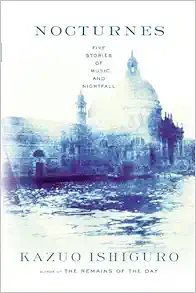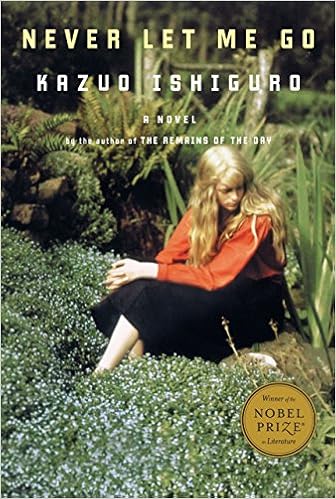
Nocturnes: Five Stories of Music and Nightfall
Hardcover – Bargain Price, September 22, 2009
Description
From Publishers Weekly This suite of five stories hits all of Ishiguro's signature notes, but the shorter form mutes their impact. In Crooner, Tony Gardner, a washed-up American singer, goes sloshing through the canals of Venice to serenade his trophy wife, Lindy. The narrator, Jan, is a hired guitar player whose mother was a huge fan of Tony, but Jan's experience playing for Tony fractures his romantic ideals. Lindy returns in the title story, which finds her in a luxury hotel reserved for celebrity patients recovering from cosmetic surgery. The narrator this time is Steve, a saxophonist who could never get a break because of his loser ugly looks. Lindy idly strikes up a friendship with Steve as they wait for their bandages to come off and their new lives to begin. In the final story, Cellists, an unnamed saxophonist narrator who, like Jan, plays in Venice's San Marco square, observes the evolving relationship of a Hungarian cello prodigy after he meets an American woman. The stories are superbly crafted, though they lack the gravity of Ishiguro's longer works ( Never Let Me Go ; Remains of the Day ), which may leave readers anticipating a crescendo that never hits. (Sept.) Copyright © Reed Business Information, a division of Reed Elsevier Inc. All rights reserved. From Bookmarks Magazine Ishiguro blends musical concepts with their literary counterparts in his latest work, and Nocturnes has the ephemeral quality of a song cycle with recurring themes and motifs developed in different prose keys. Though critics admired Ishiguro's lovely writing, "unassuming to the point of near-invisibility, like a lake whose still surface belies the turbulent currents beneath" ( Los Angeles Times ), they took issue with his characters—insubstantial and unconvincing when compared to the haunting creations found in his novels—and his implausible plot developments. Perhaps Entertainment Weekly summed it up best by stating that Nocturnes , by any other writer, would be praiseworthy; by a celebrated author like Ishiguro, it can best be likened to a minor work from a master composer. Reviews from the UK:“A brilliant new book . . . Art, its dangers, its pains and its gaiety [are] all topics seriously considered in this accomplished book.”–Frank Kermode, London Review of Books “Spellbinding . . . Each of these stories is heartbreaking in its own way, but some have moments of great comedy, and they all require a level of attention that, typically, Ishiguro’s writing rewards . . . The final story [is] exquisite.”– Observer “By now it is clear that this exquisite stylist is serious in his pursuit of a minimal–perhaps even universal–mode of expression for the emotional experiences that define our lives as human. Nocturnes is a set of poised and playful reflections on the falling away of sentiment . . . These stories recall Ishiguro’s best known novel, The Remains of the Day . In their surreal touches they resonate with The Unconsoled . And in their deceptively simple exploration of love and loss, they build on the achievement of Never Let Me Go .”– The Times “It is hardly surprising that a writer as resonant, and as emotionally pitch-perfect, as Kazuo Ishiguro should be so keen on music . . . [The title story’s] set-up is so beautifully engineered that it left me simultaneously gasping in admiration and shaking with laughter.”– Sunday Telegraph “These stories come up on you quietly, in Ishiguro’s strangely weightless style [and] haunt you for days . . . A nocturne is a piece of music inspired by, or evocative of, the night . . . These little pieces could only be the work of a great composer.”– Evening Standard “Chopin is the composer most associated with the form [of the nocturne], bringing to it grace and beauty, fragility and poise, qualities conspicuous in this diverting collection of five stories by Kazuo Ishiguro . . . Serious as Ishiguro’s intentions surely are, in these well-tempered, witty and droll stories he is more playful than he has ever been.”– Glasgow Herald “Ishiguro’s volume has the quality of a song cycle, with recurring themes developed in different guises . . . They resonate long after the book is set aside.”– Daily Telegraph “It’s hardly surprising that the arrival of a new Ishiguro book makes a reader eager to pounce on it . . . The quintet consists of first person narratives and each one is likeable, original and succeed in sustaining the reader to the final word . . . There are echoes of Somerset Maugham. But Ishiguro, the most literary of writers, is seldom derivative. [He is] a canny writer who is cool, poised and well capable of shifting directions and shaping surprises . . . Somehow he manages to say a great deal about the business of being alive.”– The Irish Times Kazuo Ishiguro is the author of six previous novels, including Never Let Me Go and The Remains of the Day , which won the Booker Prize and was adapted into an award-winning film. Ishiguro’s work has been translated into forty languages. In 1995 he received an Order of the British Empire for service to literature, and in 1998 was named a Chevalier de l’Ordre des Arts et des Lettres by the French government. He lives in London with his wife and daughter. Read more
Features & Highlights
- One of the most celebrated writers of our time gives us his first cycle of short fiction: five brilliantly etched, interconnected stories in which music is a vivid and essential character.A once-popular singer, desperate to make a comeback, turning from the one certainty in his life . . . A man whose unerring taste in music is the only thing his closest friends value in him . . . A struggling singer-songwriter unwittingly involved in the failing marriage of a couple he’s only just met . . . A gifted, underappreciated jazz musician who lets himself believe that plastic surgery will help his career . . . A young cellist whose tutor promises to “unwrap” his talent . . .Passion or necessity—or the often uneasy combination of the two—determines the place of music in each of these lives. And, in one way or another, music delivers each of them to a moment of reckoning: sometimes comic, sometimes tragic, sometimes just eluding their grasp.An exploration of love, need, and the ineluctable force of the past,
- Nocturnes
- reveals these individuals to us with extraordinary precision and subtlety, and with the arresting psychological and emotional detail that has marked all of Kazuo Ishiguro’s acclaimed works of fiction.





